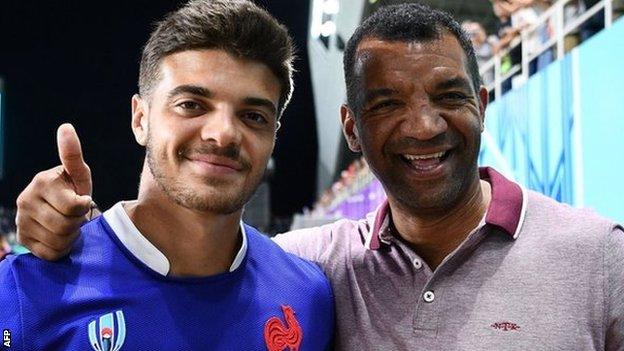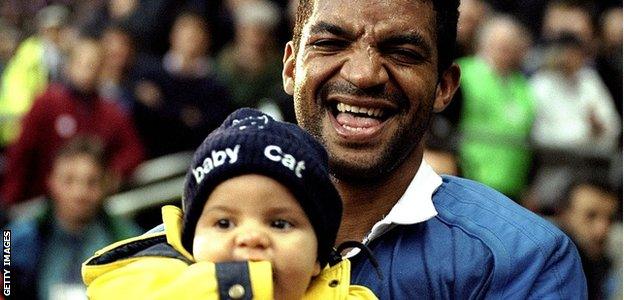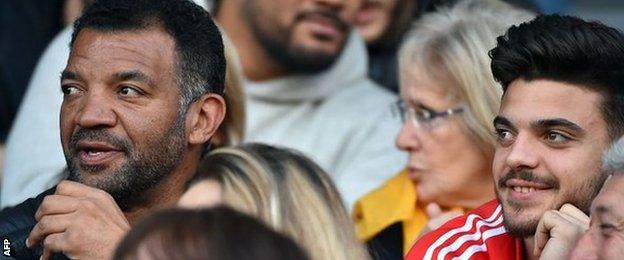Emile Ntamack: 'Rugby is in Romain's blood' - France fly-half's father
- Published
- comments

Romain Ntamack, left, has won 15 France caps since making his Test debut in February 2019
The leading points scorer of the Six Nations this year. World Rugby's breakthrough player in 2019. The matinee idol face of a new-look France, lauded as the "impeccable conductor", external of his side's win away in Cardiff 11 days ago.
Romain Ntamack is the type of precocious talent who has so many trophies he turns them into toys.
Last year, after Toulouse won the French domestic Top 14 title, a video went viral of him using the famous old shield as a skimboard, external in the Atlantic surf.
But not everyone wants his streak of success to continue. At least, not forever.
"We forget sometimes, but he is just 20," his father Emile, who won 46 caps on the wing for France and was part of the coaching staff during the 2011 tournament, told BBC Sport.
"When you are 20 you need just one thing: experience. You need to play a lot of games.
"And sometimes you maybe need things to go the wrong way, to learn. It is good. You won't like it, but sometimes you have no choice. You have to fall to rise again."
For the moment, though, there feels something inevitable about Ntamack junior's emergence at the top of the Test game, barely out of his teens.
Born with Emile's athleticism in his genes, his boyhood environment was a rugby hotbed.
As a six-month old, he was at Twickenham to see his father's side beat the All Blacks in a World Cup semi-final. He was just five when he picked up a ball himself.

Emile Ntamack's France went on to lose to Australia in the final of the 1999 Rugby World Cup after beating the All Blacks, with Romain watching, at Twickenham in the last four
He joined the junior ranks at Toulouse, where Emile was a coach, soon after, while at home his younger but bigger brother Theo, a back row forward, was a natural rival.
But rugby was not his only option and Emile made sure his son knew talent alone was not enough.
"Romain grew up with rugby in his blood," he remembers. "But it was his choice. He also tried football, karate - a lot of different sports.
"[As] a rugby player, you have to run, you have to jump, you have to develop a good vision. All sports are good when you are very young.
"But he decided on only rugby. It is his passion. And I just showed to Romain the way you need to take rugby if you want to play at a high level - you can have a talent but the real secret is all the work you're going to do."
He might have dedicated himself to rugby, but Romain is not yet a specialist. His emergence as the fly-half pilot to rescue France from an interminable tailspin is in spite of him playing much of his rugby at centre.

A day after France's win away against Wales on 22 February, Romain (right) was alongside his father watching Toulouse's home win over Montpellier
With Matthieu Jalibert and Louis Carbonel providing competition at 10, he may yet end up returning to the midfield role he shuffled into at the end of his man-of-the-match performance against Wales. Emile believes his son could make a good full-back given the chance.
That can-do attitude is something common in the coming generation led by his son.
France have won successive Under-20 World Cups, Ntamack playing in the 2018 triumph before being elevated to the senior ranks.
Props Demba Bamba and Jean Baptiste Gros, flanker Cameron Woki and centre Arthur Vincent have now followed, with coach Fabien Galthie putting his faith in youth and Antoine Dupont, only slightly older at 23, dazzling at scrum-half.
"The difference is that this generation won in the past, they know it's possible. They have no wall, no barrier," says Emile, who coached a France Under-21 team to age-grade world glory in 2006.
"Everything is possible for them. They don't care about what's happening for the French team in the past."
But for any parent, it is not so easy to be carefree on the touchlines.
"I enjoy it when he leaves the pitch," jokes Emile when asked whether he likes watching his son in action.
"It is tough, it is really tough, because you are under stress about lots of things.
"It's not just the possibility of injury, of course, but also how good are the choices he makes.
"I wasn't nervous when I was a player - but I'm very stressed now as a spectator."